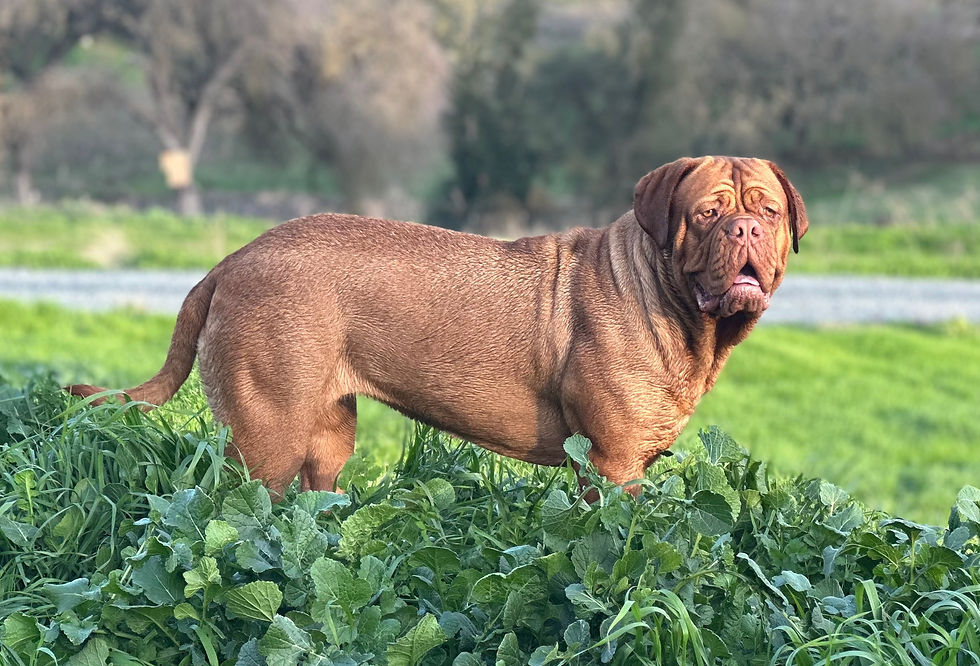



WELCOME TO PATTISON RANCH BORDEAUX
If you are interested our next litter, click our step by step guide to learn how to adopt a Pattison Ranch Bordeaux puppy. Thank you for your interest!
We are excited to share that we are planning a littler with Ruger, a male from our Remi girl's second litter, and our gorgeous girl Rayla, a female from a very special litter in France! I will provide updates here. Both Rayla and Ruger are the best of friends. They are so cute, goofy, sweet, and confident. We are so excited for their adorable puppies!!
UPDATE: We are eagerly awaiting Rayla's next heat we are hoping soon!
About the Dogue de Bordeaux Breed
Below tells you a little bit more about the Dogue de Bordeaux and why we love this breed so much! If you haven't done so already, we strongly encourage you to do your own research on this amazing breed.

Personality
Dogue de Bordeaux, also known as French Mastiffs, are loyal, protective, playful, and affectionate with their families. They are calm and gentle, but can be reserved around strangers without proper socialization. Along with that calm temperament comes stubbornness and self-confidence. Socialization, patience, and positive-reinforcement training works very well with this breed. At Pattison Ranch Bordeaux, we socialize our puppies from a young age with children and adults and encourage families to continue socialization with folks outside the family as it promotes their lovable, friendly personalities!

Training and Exercise
When trained, the Dogue de Bordeaux has the potential to be a gentle, affectionate and docile breed, compatible with children and other house pets. Early training and socialization are crucial for this breed. Because DDBs have historically been used to guard people and property, they require dedicated positive reinforcement training and early socialization to be well-mannered companions. To prevent developmental problems, you shouldn't allow your DDB to engage in excessive or high-impact exercise until at least 18 months old. Providing French Mastiff's with interactive toys, puzzle games, and regular exercise sessions will help keep them mentally stimulated. Along with training, adequate exercise, such as one long walk or a few shorter walks each day, totaling about 30-45 minutes.

Nutrition
The Dogue de Bordeaux should be fed a high-quality dog food appropriate to the dog's age (puppy, adult, or senior). Be sure to keep an eye on the amount of food you give your Dogue de Bordeaux, and reduce portions if your pup gains weight. The best diet for a DDB is balanced and appropriate for their life stage and energy needs. This typically includes a combination of high-quality protein, healthy fats, vitamins, minerals, and fiber from vegetables and berries. The average adult Dogue de Bordeaux might need 4 to 5 cups of high-quality dry dog food per day. This can be adjusted based on the dog's activity level and the food's caloric density.

Grooming
Grooming needs are relatively low for this breed; they have a short, dense coat that requires weekly brushing to keep shedding under control. The Dogue de Bordeaux is a drooler, and the wrinkles on their facial area need special attention at least weekly, sometimes daily, to see that they are kept clean and dry. At least once a week it's also important to clean the ears and check for debris or signs of infection. A bath every 4-8 weeks is usually sufficient unless your pup gets into something that makes them particularly dirty. In between baths, wiping him down with a damp towel can keep him looking and smelling great. As with all dogs, nails need to be trimmed regularly (about monthly).

Health
On average, a healthy Dogue de Bordeaux will weigh 100-150 lbs (45-64 kg) with discrepancies across gender, and have a life expectancy of 10-11 years when cared for accordingly. It's important to know the potential health issues for DDBs. Bloat, or gastric dilatation and volvulus (GDV), is a serious concern in the Dogue de Bordeaux. Owners should educate themselves to recognize the signs that bloat could be happening, and know what actions to take if so. To reduce the chances of bloat in dogs, you can: vfeed them multiple small meals throughout the day instead of one large meal, avoid vigorous exercise right after eating and right before, use a slow feeder bowl if they eat quickly, and maintain a healthy weight. Because of their large size, orthopedic issues (such as hips and elbows) are common and another reason to maintain healthy weight and avoid high-impact exercise until at least 18 months old.

History
An ancient French breed, the Dogue de Bordeaux (also known as the French Mastiff) was originally bred in the 12th century to be a hunting dog. Over the years, it's also been used for guarding and herding. The breed's exact origins are unclear. A host of breeds—including various Mastiff- and Molossus-type guard dogs—likely contributed to the Dogue de Bordeaux as we know it today. In 1863, the breed officially earned its name after winning a competition in the first canine exhibition at the Jardin d'Acclimatation in Paris. DDB populations dropped significantly during the French Revolution, but in the early 1990s the breeds popularity in America began to rise. The American Kennel Club formally recognized the breed in 2008.

CONNECT WITH US
Want to learn more about our pups? Get in touch!
California, USA
